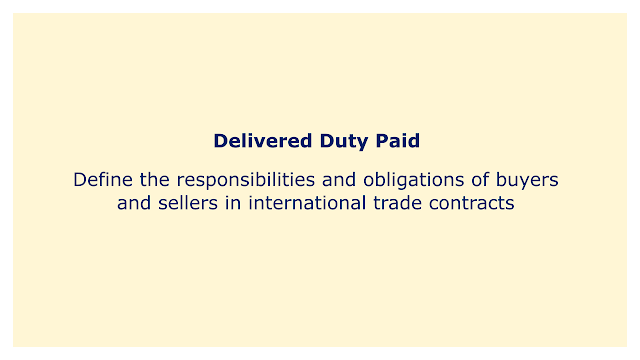 |
| Image: Moneybestpal.com |
Another phrase that is a part of the Incoterms, which specify the duties and obligations of buyers and sellers in international trade contracts, is Delivered Duty Paid (DDP). The International Chamber of Commerce (ICC) publishes Incoterms, which are regularly updated to take into account modifications to laws and business practices. The most recent Incoterms version was made public in 2020.
DDP, as defined by Incoterms 2020, denotes that the goods are delivered when the seller places them at the buyer's disposal on a vehicle that is prepared for offloading at a specified location. The costs associated with shipping the products there, such as those for freight, insurance, transit formalities, import clearance, and any applicable taxes or charges like the Value-Added Tax (VAT) or Goods and Services Tax (GST), are the seller's responsibility. Only at the destination must the products be removed from the car by the buyer. When the products are prepared for unloading at the destination, the risk is transferred from the seller to the buyer.
The term "DDP" is applicable to any method of transportation, including land, air, sea, and inland waterways, as well as any combination of modes. It is appropriate for circumstances where the seller has direct access to or influence over customs processes at both the country of origin and the country of destination, such as when selling inside a free trade zone or a common market. It is also appropriate for circumstances in which customs fees or taxes are negligible or predictable at the final destination, such as when dealing with preferential tariff arrangements or unique regulatory frameworks.
Buyers and sellers, however, need to be aware of several restrictions and difficulties with DDP.. For example:
- DDP places a significant load on sellers who need to adhere to intricate customs laws and tax regimes in many nations. If sellers lack the necessary expertise or knowledge to handle these problems, this could lead to problems or hazards.
- DDP could subject sellers to greater prices compared to other agreements that transfer costs earlier in the transportation process, like Free Carrier (FCA) or Carriage Paid To (CPT). In some marketplaces, this may have an impact on a seller's capacity to make a profit and compete.
- Compared to other phrases that transfer risk later in transportation, such as Delivered at Place (DAP) or Delivered at Place Unloaded (DPU), DDP may expose customers to reduced control over their supply chain. In some marketplaces, this may limit the adaptability and reactivity of customers.
- DDP may lead to inconsistencies between sellers' duties under Incoterms 2020 and destination-specific local laws or regulations. For instance, regardless of the wording of the contract, some nations may require buyers to operate as importers of record or pay specific taxes.
